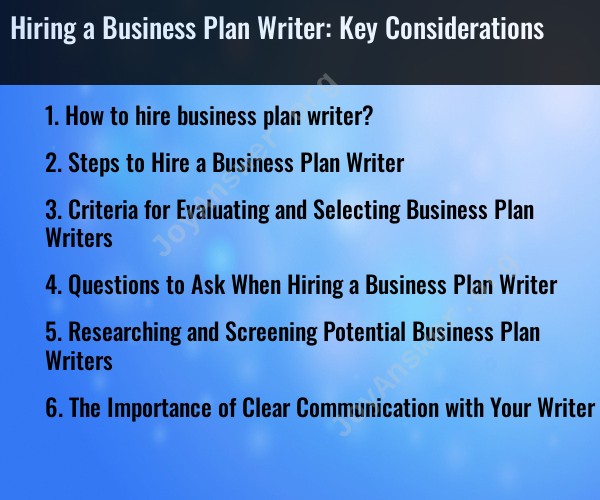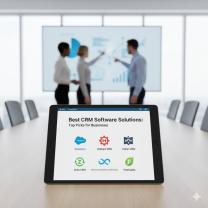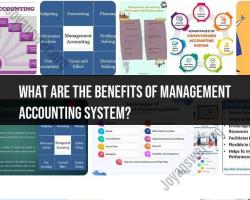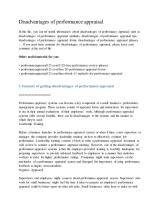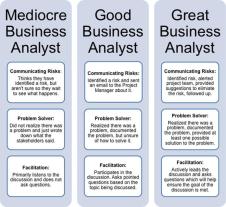How to hire business plan writer?
Hiring a business plan writer can be a valuable investment for your business, especially if you need a well-crafted business plan to secure funding or guide your company's growth. Here are some key considerations when hiring a business plan writer:
Define Your Objectives:
- Clarify the purpose of the business plan. Are you seeking funding from investors or lenders? Do you need a plan for internal use and strategy development? Knowing your objectives will help you find a writer with the right expertise.
Experience and Expertise:
- Look for a writer with experience in your industry or a similar one. They should understand your market, competition, and the specific challenges your business faces. Ask for their portfolio to assess their previous work.
References and Reviews:
- Ask for references from past clients and check reviews or testimonials. Contact previous clients to inquire about their experience and the effectiveness of the business plans created.
Qualifications:
- Verify the writer's qualifications. Many business plan writers have degrees in business, finance, or related fields. Certification from a professional organization like the Association of Business Executives (ABE) can also be a good sign.
Communication Skills:
- Effective communication is crucial. The writer should be able to understand your business, ideas, and goals and translate them into a well-structured, coherent, and convincing business plan.
Customization:
- Ensure that the writer is willing to create a customized business plan tailored to your specific needs, rather than using generic templates.
Pricing Structure:
- Understand the writer's pricing structure. Some writers charge a flat fee, while others charge by the hour. Make sure you have a clear understanding of the costs involved and what's included in the fee.
Timeline and Availability:
- Discuss the project timeline and the writer's availability. Ensure they can meet your deadlines, especially if you have specific requirements, such as applying for a grant or investor pitch events.
Non-Disclosure Agreement (NDA):
- Depending on the sensitivity of your business information, consider having the writer sign an NDA to protect your confidential data.
Contract and Terms:
- Have a written agreement in place that outlines the scope of work, deliverables, deadlines, payment terms, and any other relevant terms and conditions.
Collaboration and Revisions:
- Clarify how the collaboration will work. Will the writer collaborate closely with you to gather information and provide drafts for feedback and revisions?
Portfolio Review:
- Ask to see samples of previous business plans they have written to evaluate their writing style, organization, and the quality of their work.
Timeline and Milestones:
- Agree on a project timeline with specific milestones for deliverables and revisions. This ensures that the project stays on track.
Payment Structure:
- Determine how and when payments will be made. It's common to pay a portion of the fee upfront and the rest upon completion of the project or at specific milestones.
Legal and Regulatory Compliance:
- Make sure the writer complies with any legal or regulatory requirements related to business plan writing in your jurisdiction.
Flexibility and Adaptability:
- The writer should be open to feedback and revisions as the business plan evolves. Ensure they are adaptable and willing to make changes as needed.
Hiring a business plan writer is an important decision for your business's success. Take the time to research and interview potential candidates, ask for references, and carefully evaluate their qualifications and approach. A well-crafted business plan can be a valuable asset, so choose your writer with care.
Steps to Hire a Business Plan Writer
Hiring a business plan writer can be an invaluable step in launching your business or securing funding. Here's a step-by-step guide to hiring the right writer for your needs:
Define your needs: Clearly outline your expectations for the business plan, including the level of detail, industry expertise required, and preferred writing style.
Research and identify potential writers: Conduct online searches, attend industry events, and network with business professionals to identify potential writers with relevant experience and expertise.
Review portfolios and testimonials: Evaluate the writer's past work, including sample business plans and client testimonials, to assess their writing skills, industry knowledge, and ability to meet your requirements.
Schedule consultations: Schedule initial consultations with shortlisted writers to discuss your business idea, goals, and expectations. Assess their communication skills, understanding of your business, and ability to align with your vision.
Request proposals and compare fees: Request detailed proposals from each writer, outlining their approach, deliverables, timeline, and fees. Compare the proposals carefully to determine the best value for your investment.
Make your selection: Based on your evaluation and consultations, select the writer who best aligns with your needs, demonstrates expertise in your industry, and provides a clear and comprehensive proposal.
Criteria for Evaluating and Selecting Business Plan Writers
When evaluating potential business plan writers, consider the following criteria:
Industry expertise: Ensure the writer has experience writing business plans for businesses in your industry or a related field.
Writing skills: Assess the clarity, conciseness, and professionalism of the writer's sample work.
Understanding of business fundamentals: Verify the writer's grasp of financial projections, market analysis, and business strategy development.
Communication skills: Evaluate the writer's ability to understand your needs, ask clarifying questions, and communicate effectively throughout the process.
Fees and terms: Compare the writer's fees, payment terms, and deliverables to ensure they align with your budget and expectations.
Questions to Ask When Hiring a Business Plan Writer
During consultations with potential writers, ask insightful questions to gauge their suitability:
Describe your experience writing business plans for businesses in my industry?
How do you approach research and gather information for a business plan?
What is your process for ensuring the financial projections are accurate and realistic?
How do you incorporate feedback and revisions into the business plan?
What are your availability and communication preferences throughout the project?
Researching and Screening Potential Business Plan Writers
Utilize various resources to identify and screen potential business plan writers:
Online directories: Search online directories like Upwork, Fiverr, and Guru for freelance business plan writers.
Industry associations: Check with industry associations or professional networks for recommendations of experienced writers.
Word-of-mouth referrals: Ask business owners, entrepreneurs, or investors in your network for recommendations.
Online reviews: Read reviews and testimonials from previous clients to assess the writer's reputation and quality of work.
The Importance of Clear Communication with Your Writer
Clear and consistent communication is crucial throughout the business plan writing process:
Clearly define your goals and expectations: Clearly convey your vision, objectives, and target audience for the business plan.
Provide timely feedback: Review drafts promptly and provide constructive feedback to ensure the plan aligns with your vision.
Maintain open communication: Maintain open communication throughout the process to address any questions, concerns, or changes in direction.
Establish clear deadlines: Set clear deadlines for each stage of the writing process to ensure timely completion.
Use effective communication tools: Utilize email, project management tools, or regular meetings to stay connected and track progress.
